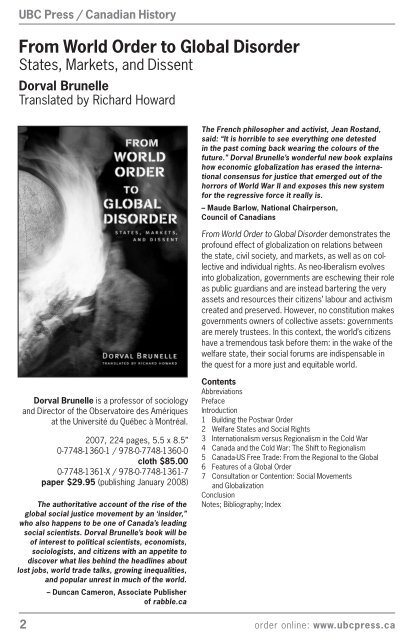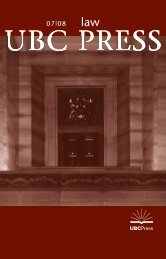From World Order to Global Disorder - UBC Press
From World Order to Global Disorder - UBC Press
From World Order to Global Disorder - UBC Press
Create successful ePaper yourself
Turn your PDF publications into a flip-book with our unique Google optimized e-Paper software.
<strong>UBC</strong> <strong>Press</strong> / Canadian His<strong>to</strong>ry<br />
<strong>From</strong> <strong>World</strong> <strong>Order</strong> <strong>to</strong> <strong>Global</strong> <strong>Disorder</strong><br />
States, Markets, and Dissent<br />
Dorval Brunelle<br />
Translated by Richard Howard<br />
The French philosopher and activist, Jean Rostand,<br />
said: “It is horrible <strong>to</strong> see everything one detested<br />
in the past coming back wearing the colours of the<br />
future.” Dorval Brunelle’s wonderful new book explains<br />
how economic globalization has erased the international<br />
consensus for justice that emerged out of the<br />
horrors of <strong>World</strong> War II and exposes this new system<br />
for the regressive force it really is.<br />
– Maude Barlow, National Chairperson,<br />
Council of Canadians<br />
<strong>From</strong> <strong>World</strong> <strong>Order</strong> <strong>to</strong> <strong>Global</strong> <strong>Disorder</strong> demonstrates the<br />
profound effect of globalization on relations between<br />
the state, civil society, and markets, as well as on collective<br />
and individual rights. As neo-liberalism evolves<br />
in<strong>to</strong> globalization, governments are eschewing their role<br />
as public guardians and are instead bartering the very<br />
assets and resources their citizens’ labour and activism<br />
created and preserved. However, no constitution makes<br />
governments owners of collective assets: governments<br />
are merely trustees. In this context, the world’s citizens<br />
have a tremendous task before them: in the wake of the<br />
welfare state, their social forums are indispensable in<br />
the quest for a more just and equitable world.<br />
Dorval Brunelle is a professor of sociology<br />
and Direc<strong>to</strong>r of the Observa<strong>to</strong>ire des Amériques<br />
at the Université du Québec à Montréal.<br />
2<br />
2007, 224 pages, 5.5 x 8.5”<br />
0-7748-1360-1 / 978-0-7748-1360-0<br />
cloth $85.00<br />
0-7748-1361-X / 978-0-7748-1361-7<br />
paper $29.95 (publishing January 2008)<br />
The authoritative account of the rise of the<br />
global social justice movement by an ‘insider,”<br />
who also happens <strong>to</strong> be one of Canada’s leading<br />
social scientists. Dorval Brunelle’s book will be<br />
of interest <strong>to</strong> political scientists, economists,<br />
sociologists, and citizens with an appetite <strong>to</strong><br />
discover what lies behind the headlines about<br />
lost jobs, world trade talks, growing inequalities,<br />
and popular unrest in much of the world.<br />
– Duncan Cameron, Associate Publisher<br />
of rabble.ca<br />
Contents<br />
Abbreviations<br />
Preface<br />
Introduction<br />
1 Building the Postwar <strong>Order</strong><br />
2 Welfare States and Social Rights<br />
3 Internationalism versus Regionalism in the Cold War<br />
4 Canada and the Cold War: The Shift <strong>to</strong> Regionalism<br />
5 Canada-US Free Trade: <strong>From</strong> the Regional <strong>to</strong> the <strong>Global</strong><br />
6 Features of a <strong>Global</strong> <strong>Order</strong><br />
7 Consultation or Contention: Social Movements<br />
and <strong>Global</strong>ization<br />
Conclusion<br />
Notes; Bibliography; Index<br />
order online: www.ubcpress.ca













